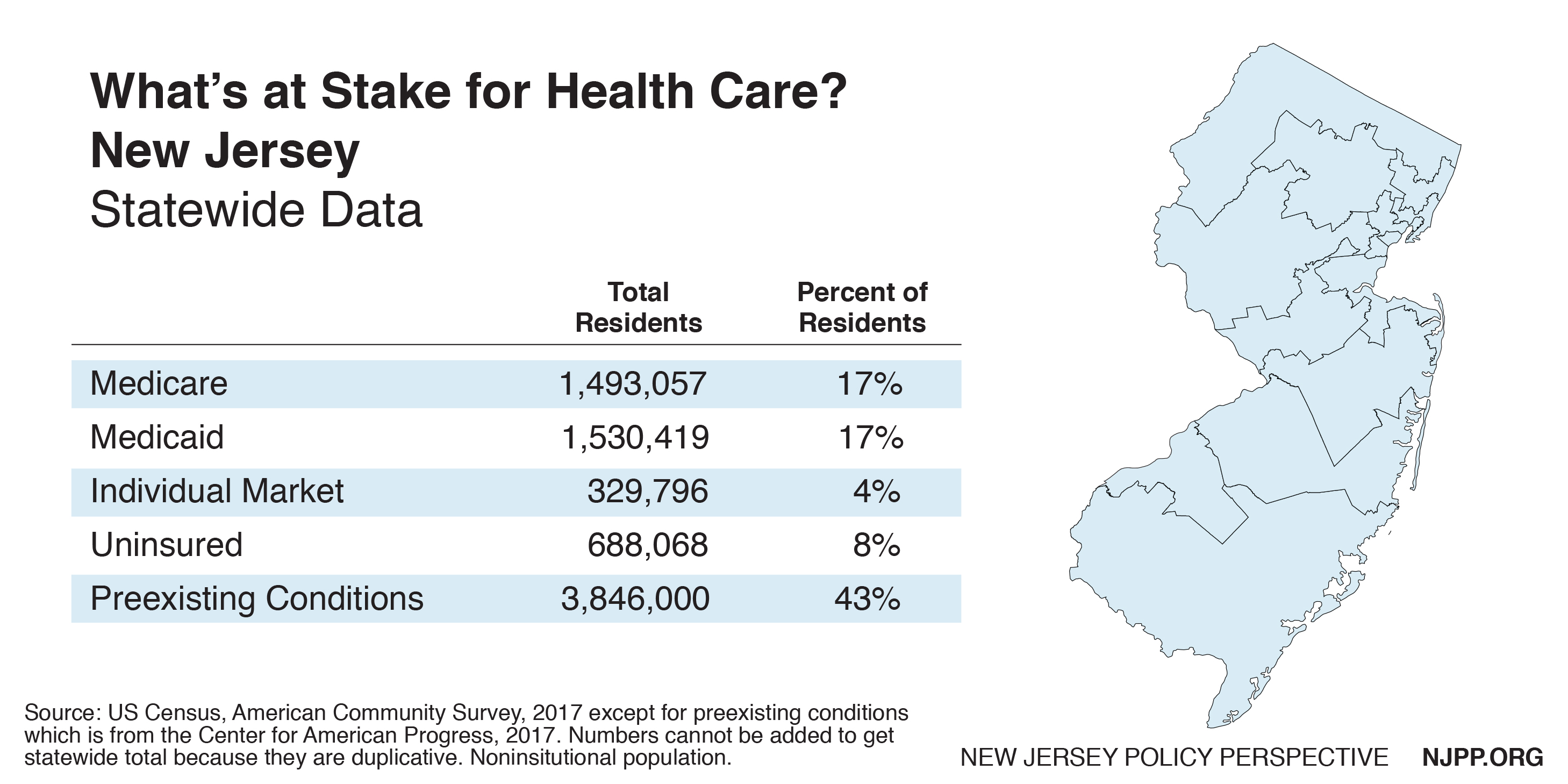To read a PDF version of this report, click here.
For impact data by congressional district, click here.
Heading into the midterm elections, polls have shown that the number one concern of Americans – both Democrats and Republicans – is health care. This concern is understandable, especially in a state like New Jersey, given the millions of people who would be affected by threatened changes in federal health policy, a renewed effort to repeal the Affordable Care Act (ACA), or a scaling back of entitlement programs that are the bedrock of the nation’s safety net. Because New Jersey made the right decision to expand Medicaid under the ACA, repeal of that provision alone would result in the loss of health coverage for 800,000 New Jerseyans. In addition, there are other major threats to Medicare and the entire Medicaid program, as well as to residents who have pre-existing conditions or are uninsured.
The purpose of this report is to provide the facts that show how many New Jersey residents participate in the programs that could potentially be affected by these proposed changes statewide and by congressional districts (attached) using the most recent US census data released last month.Many New Jerseyans in all congressional districts could be affected by all the proposed changes, but the number varies based in the program and the congressional district.

Up to 1.7 million New Jerseyans on Medicaid could lose part or all of their coverage
Medicaid has already been on the chopping block for the last two years. In legislation to repeal the ACA that almost passed Congress, Medicaid expansion would have been phased out completely, resulting in a half million New Jerseyans losing health coverage. Even worse in the long term, overall funding for Medicaid would have been permanently capped, resulting in the loss of billions of dollars in New Jersey and threatening health coverage for everyone on Medicaid. Because about two-thirds of Medicaid funding is for seniors and people with disabilities, they would most likely have been affected the most by such a major cutback. Also, one out of four children in New Jersey are covered by Medicaid.
Health coverage is threatened for up to 330,000 New Jerseyans who purchased their insurance directly
About 330,000 New Jersey residents rely on the individual market to obtain health care coverage. About 240,000 of them purchased their insurance through the federal Marketplace. It is in this category where most of the federal cutbacks have been made, such as eliminating funding for cost-sharing subsidies, eliminating the individual mandate and a reduction in outreach funds. Repeal of the ACA would result in the loss of coverage for most of these individuals. About 80 percent of all New Jersey residents obtaining health coverage in the federal Marketplace receive federal subsidies which protect them from high premiums. However, about 140,000 New Jerseyans do not receive these subsidies and had to pay for the full twenty percent increase in premiums this year. Not surprisingly, as a result of these cutbacks, the enrollment in all these plans decreased by about 40,000 over the past year.
Up to 3.8 million New Jerseyans are threatened by proposals to effectively eliminate current protections for preexisting conditions
Protections in the ACA for Americans who have preexisting conditions remains one of the most contentious health issues in Congress. Because polls have shown that this is the most popular provision in the ACA, some Republican members of Congress have been quick to point out that they support continuing this protection. However, most of these same Republicans have supported allowing insurers to exclude essential benefits that these individuals need or to charge any premium they want, which would have the same effect as repealing the protection since virtually no one but the wealthy could afford necessary coverage. In addition, the Trump administration has recommended in a Texas federal district court case that it invalidate the ACA’s core protections for people with preexisting conditions and allow non-compliant plans that would eliminate the availability of affordable comprehensive coverage. If the Texas court made such an adverse decision, and the Supreme Court upheld it, only an act of Congress signed by President Trump could remedy this problem.
Proposed federal cutbacks in Medicare threaten health coverage for up to 1.5 million New Jerseyans
Medicare is at major risk for cutbacks to offset the massive federal tax cuts that were enacted last year. The tax overhaul, which mainly benefits the wealthy, will deplete the federal revenues required to meet the escalating costs of Medicare, as well as other programs, in the future. Funding for Medicare represents 15 percent of the federal budget; the only other category that is slightly larger is Medicaid. Right after passage of these tax cuts, Republican leaders in Congress began to insist that “entitlement reform” was necessary to make up for these lost revenues. House Speaker Paul Ryan specifically mentioned Medicare as the “the biggest entitlement we’ve got to reform.” Some Republicans have also proposed privatizing Medicare by converting it to a voucher program for new beneficiaries that would limit how much an individual could spend on health care. Democrats, on the other hand, have been very protective of Medicare as it is, and some of them are urging different versions of a “Medicare for All” policy that would greatly expand Medicare for current beneficiaries and make many more Americans eligible.
Many of the 688,000 New Jerseyans who are uninsured could lose any opportunity to obtain health coverage
Remarkably, the ACA reduced the number of New Jersey’s uninsured by about a third. However, that still leaves too many New Jerseyans who are uninsured. About half of the uninsured (338,000 New Jerseyans) are eligible for Medicaid or tax credits under the ACA but would not be if the ACA were repealed or became more restrictive. Many of these eligible New Jerseyans do not seek insurance under the ACA because they do not know they are eligible for subsidies. Under the Trump administration, the open enrollment period was shortened by half and funding for navigators who help the uninsured apply for assistance was cut by about two-thirds. Repeal of the ACA would mean that all of these New Jersey residents would lose any hope of obtaining health coverage and the number of uninsured in New Jersey would jump to about 1.2 million.

